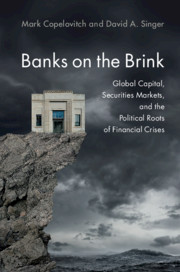‘This book is really interesting, and potentially very important for our understanding of crises and for public policy. Copelovitch and Singer advance a thesis that is quite different, and considerably more subtle, than the standard accounts of why legislators tolerate fragile financial systems. This survives its own tests. I hope others pick up the challenge.'
Paul Tucker - Harvard University
‘The best scholarship in political economy combines macroeconomics with a deep sense of its social and historical embeddedness. Copelovitch and Singer's work is such a masterpiece … This book is not only a brilliant empirical investigation, but also a compelling history of the financial development of Canada and Germany. Anybody interested in financial market stability, from regulators to scholars and journalists, should read this work.'
Mark Manger - University of Toronto
‘Copelovitch and Singer provide a compelling, comprehensive, and well-written analysis of why some countries are prone to banking crises while others are not. By demonstrating how the institutional context and the availability of international capital jointly shape banks' propensity to engage in risky behavior, this impressive book makes an important and timely contribution to our understanding of how globalization affects the stability of the world economy.'
Stefanie Walter - Universität Zürich
‘Modern economic history is littered with banking crises that devastate economies and polarize politics. In Banks on the Brink, Mark Copelovitch and David Singer analyze the sources of these crises. They argue that domestic financial-market conditions, especially the role of securities markets, and international capital flows are responsible for banking crises. Their careful logic, statistical analyses, and detailed case studies make compelling reading for anyone interested in the economics and politics of finance.'
Jeffry Frieden - Harvard University
‘Much recent work on banking crises focuses on emerging market economies in East Asia and Latin America. This timely book instead asks why there are banking crisis in developed economies and what policy-makers can do about them. As in the emerging market cases, the authors find that capital flows from abroad are an important potential trigger for banking crises. But what sets the developed world apart is the potential use of such capital and the structure of their financial systems, which are linked. As the case studies for Canada and Germany indicate, banks in countries with underdeveloped securities markets do not face pressure to channel this ‘hot' capital to risky uses. In countries with developed security markets, however, risky behaviour is more likely, as are then banking crises. The policy implications follow convincingly from the analysis – address large current account deficits and increase capital requirements. Anyone interested in understanding crises and how to make them less frequent should read this book.'
Mark Hallerberg - Hertie School of Governance
‘This book compares the two designs and focuses on financial market disintermediation and the importance of cross-border capital flows to explain the degree of financial instability in the two countries. Key lessons (and a few surprises) are drawn from the two cases for policy initiatives to contain damaging instability at tolerable costs to financial efficiency and innovation.’
I. Walter
Source: Choice





